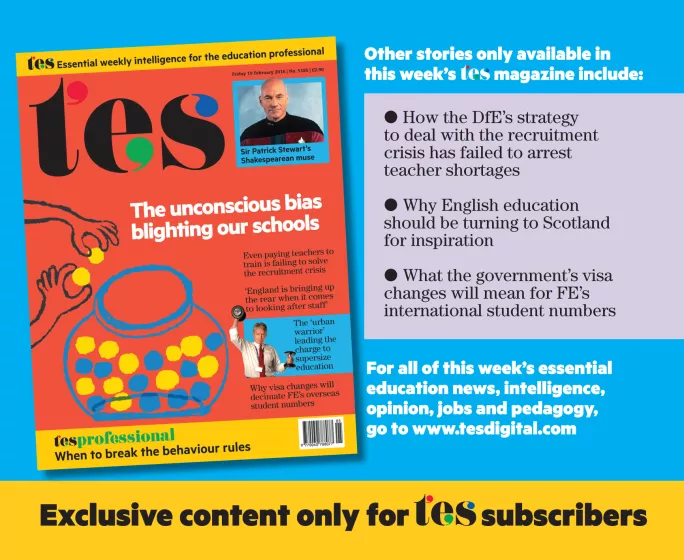- Home
- Suits you, Sir...but don’t tell staff how to dress
Suits you, Sir...but don’t tell staff how to dress

When Ofsted gives a verdict of “requires improvement”, it does not usually extend to staff clothing. But a new headteacher at one South London school wanting to boost his institution’s standing has taken the rating to heart and given the phrase “dress for success” a whole new meaning in the process.
He believes that teachers should look as smart as his pupils do in their uniform. The fashion crime that set him off? Wearing a jumper with a shirt and tie - or, as it’s known in the trade, “the geography teacher”.
And he plans to police his new code by following up with those whose clothing does not meet his approval. You can imagine them all lining up for inspection every morning. “Do that top button up.” “Where’s your tie?” “That skirt’s a bit short, isn’t it?”
Infantilisation: the height of fashion
It’s part of a current trend in education to try to dictate what adults should wear.
A primary head in Darlington recently wrote to parents asking them not to wear pyjamas when dropping their kids off at the school, or, for that matter, at assemblies, the school Christmas show and parents’ evenings.
And Ofsted called upon its inspectors to “uphold the highest standards” and “dress appropriately” when representing the inspectorate. Oversized jewellery is out for women, as are earrings for men.
Hang on a minute: it’s one thing to insist that children wear a uniform, but it’s quite another to demand the same of adults. It’s infantilising the profession by treating staff like the children they teach. You can tell adults to dress smartly; you don’t need to tell them what smart means.
Dressing to impress
At the heart of this is, of course, an assertion of control; it’s saying: “I’m in charge.” Now that’s all well and good when it comes to children, but adults? And berating parents is surely overreaching one’s jurisdiction.
Men, one might argue, are least affected, already pretty much wearing standardised clothing. But it’s more complicated for women (who make up some 75 per cent of the teaching profession), and it’s a particular problem when going for promotion. Delegates at #WomenEd events have talked of adjusting how they dress because of feedback.
They feel that they cannot show any personality in what they wear because of the innate conservatism of interviewers.
When many chairs of governors come from the world of business, is it any surprise that a boring business uniform of a suit is favoured, even for a woman?
People appoint in their own likeness, whether consciously or not, and unconscious bias is examined in some depth this week (pages 26-32 in this week’s TES magazine).
Do clothes make the man?
Sir Michael Wilshaw, who was apparently a stickler for business-like attire when a school leader, would no doubt applaud the South London headteacher, who told his local newspaper: “It’s about business suits, business dress, and showing our standards and expectations in all things that we do and that shows in how we dress as professionals.”
But does one’s clothing make one professional? Or, more to the point, does not wearing a business suit mean someone is unprofessional? Read next week’s TES for more thoughts on that from headteacher Jarlath O’Brien.
Perhaps teacher John David Blake’s suggestion of academic dress a couple of months back wasn’t so daft after all.
It would allow staff to express themselves (a fur trim for the arts perhaps?) while satisfying the demands of those in power. What could announce authority better than that majestic cover-all, the academic gown? Except, of course, trusting teachers to make their own sensible sartorial decisions.
This is an article from the 19 February edition of TES. This week’s TES magazine is available in all good newsagents. To download the digital edition, Android users can click here and iOS users can click here

Want to keep up with the latest education news and opinion? Follow TES on Twitter and like TES on Facebook
Keep reading for just £1 per month
You've reached your limit of free articles this month. Subscribe for £1 per month for three months and get:
- Unlimited access to all Tes magazine content
- Exclusive subscriber-only stories
- Award-winning email newsletters



